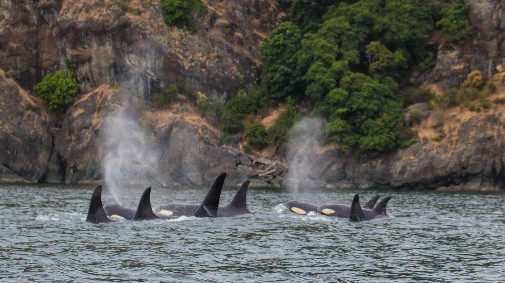Menopause explains why some female whales live so long
Posted on 13 March 2024
 The researh showed that whales and humans show remarkably similar life histories
The researh showed that whales and humans show remarkably similar life histories
The study focused on five whale species that – along with humans – are the only mammals known to go through menopause.
The findings show that females of these whale species that experience menopause live around 40 years longer than other female whales of a similar size.
By living longer without extending their “reproductive lifespan” (the years in which they breed), these females have more years to help their children and grandchildren, without increasing the “overlap” period when they compete with their daughters by breeding and raising calves at the same time.
Whales and humans
This new research shows that – despite being separated by 90 million years of evolution – whales and humans show remarkably similar life histories, which have evolved independently.
The study was carried out by the universities of York and Exeter, and the Center for Whale Research.
Professor Dan Franks, from the University of York’s Department of Biology and one of the authors of the paper, said: “Previous research on menopause evolution has tended to focus on single species, typically humans or killer whales.
“This study is the first to cross several species, enabled by the recent discovery of menopause in multiple species of toothed whales. Our study provides evidence that menopause evolved by expanding female lifespan beyond their reproductive years, rather than from reduced reproductive lifespan.
“This is a question that has long been asked in anthropology, but can only be directly answered with a comparative study."
Future generations
Lead author, Dr Sam Ellis, from the University of Exeter added:“The process of evolution favours traits and behaviours by which an animal passes its genes to future generations.
“The most obvious way for a female to do this is to breed for the entire lifespan – and this is what happens in almost all animal species. There are more than 5,000 mammal species, and only six are known to go through menopause.
“So the question is: how and why did menopause evolve? Our study provides some of the answers to this fascinating puzzle.”
Five species
Menopause is known to exist in five species of toothed whale: short-finned pilot whales, false killer whales, killer whales, narwhals and beluga whales.
As well as outliving females of other similar-sized species, females in these five species outlive the males of their own species. For example, female killer whales can live into their 80s, while males are typically dead by 40.
“The evolution of menopause and a long post-reproductive life could only happen in very specific circumstances,” said Professor Darren Croft, from the University of Exeter.
“Firstly, a species must have a social structure in which females spend their lives in close contact with their offspring and grand-offspring.
“Secondly, the females must have an opportunity to help in ways that improve the survival chances of their family. For example, female toothed whales are known to share food and use their knowledge to guide the group to find food when it is in short supply.”
Life histories
Commenting on parallels with the evolution of menopause in humans, Professor Croft added: “It’s fascinating that we share this life history with a taxonomic group we’re so different from.
“Despite these differences, our results show that humans and toothed whales show convergent life history – just like in humans, menopause in toothed whales evolved by selection to increase the total lifespan without also extending their reproductive lifespan.”
The study, published in Nature, was funded by the Leverhulme Trust and the Natural Environment Research Council (NERC).
Explore more news

Sodium channels in breast cancer cells a promising target for future treatments, study reveals
Thursday 25 July 2024

Researchers to measure the impact of hot weather on UK classrooms
Wednesday 24 July 2024

Hunter-gatherers kept an 'orderly home' in the earliest known British dwelling, study shows
Tuesday 23 July 2024

Study uses Game of Thrones to advance understanding of face blindness
Tuesday 23 July 2024

York academic contributes to new report on men’s health which reveals disparities between most and least deprived areas in the UK
Wednesday 17 July 2024
Media enquiries
About this research
The paper, published in the journal Nature, is entitled: The evolution of menopause in toothed whales.
